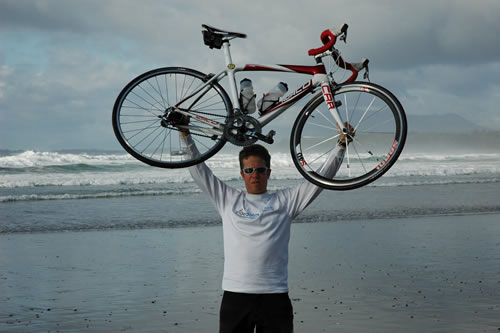Published: November 12, 2011
The always excellent “All in the Mind“, this week casts a spotlight on loneliness.
Loneliness has been with Emily White for as long as she can remember. Smart, savvy, popular – none of this has inoculated her against ‘the ghost in her life’. Her memoir is an encounter with the emerging, powerful science of loneliness, and a taboo like few.
 Listen Now
Listen Now
Published: November 12, 2011

Mental health advocate Michael Schratter completed his epic worldwide solo cycling journey in Vancouver today after crossing six continents and 33 countries over 469 days. (CNW Group/Canadian Mental Health Association, BC Division)
fter a courageous solo bicycle trek around the world, crossing six continents and 33 countries, mental health advocate and Vancouver school teacher Michael Schratter is finally home.
His worldwide, 469-day “Ride Don’t Hide” cycling journey has made an indelible impact, raising awareness and helping to overcome the stigma around mental illness for the one in five Canadians who suffer from mental health issues such as depression, anxiety disorders and schizophrenia.
Today, mental health supporters welcomed Michael home as more than 200 cycled along with him from Tsawwassen and Richmond into Vancouver for a celebration event at Rogers Arena, completing his journey. There, Michael shared his adventures from his worldwide trek and personal story with a large crowd of supporters and fans, including Vancouver Canucks owner Francesco Aquilini and General Manager Mike Gillis, who cycled the final leg with Michael.
A Vancouver school teacher diagnosed with bi-polar disorder, Michael began his “Ride Don’t Hide” campaign on August 1, 2010 with the goal of cycling 40,000 km around the globe, and raising $100,000 for the Canadian Mental Health Association’s youth programs.
All he had was a bike, a knapsack and a determination to live out a dream to create awareness and help empower people dealing with mental health challenges. He started out in Vancouver, rode down through the west coast of the United States, Mexico and South America, flew over to the east coast of Australia and cycled up through Asia and then hopped over to Europe. He did all of this by taking a year off from his job as a grade five teacher, using his own funds to finance the journey as he travelled the globe. [continue reading…]
Published: November 11, 2011
 Veterans Day on Nov. 11 offers an opportunity to illuminate how the science of psychology is helping service members adjust to life at home after the trauma of war. Psychologist and APA member Antonette M. Zeiss, PhD, is chief consultant, Office of Mental Health Services, U.S. Department of Veterans Affairs. Dr. Zeiss is responsible for policy and program guidance development for all VA mental health services. That includes a special focus on the VA Uniform Mental Health Services Handbook, which describes the continuum of mental health care mandated to be delivered in the VA.
Veterans Day on Nov. 11 offers an opportunity to illuminate how the science of psychology is helping service members adjust to life at home after the trauma of war. Psychologist and APA member Antonette M. Zeiss, PhD, is chief consultant, Office of Mental Health Services, U.S. Department of Veterans Affairs. Dr. Zeiss is responsible for policy and program guidance development for all VA mental health services. That includes a special focus on the VA Uniform Mental Health Services Handbook, which describes the continuum of mental health care mandated to be delivered in the VA.
Dr. Zeiss has been with the VA since 1982. She was previously director of Interdisciplinary Team Training and Development, and then director of Psychology Training and assistant chief of psychology at the VA Palo Alto Health Care System. She came to the VA Central Office in 2005 as the deputy chief consultant for the Office of Mental Health Services. She has served on the editorial boards of nine professional journals and has published extensively on mental health policy, heath care service delivery and depression treatment and risk factors.
The APA recently posed the six questions to Dr. Zeiss:
APA: How has veterans mental health care changed over the past 25 years and what do you consider the most significant change?
Dr. Zeiss: The primary change is the enormous expansion of mental health services delivered in the Department of Veterans Affairs health care system. VA’s full spectrum of health care now integrates mental health at every level of care. [continue reading…]
Published: November 10, 2011

Image: Stockxpert
s a fetus grows, it’s constantly getting messages from its mother. It’s not just hearing her heartbeat and whatever music she might play to her belly; it also gets chemical signals through the placenta. A new study, which will be published in Psychological Science, a journal of the
Association for Psychological Science, finds that this includes signals about the mother’s mental state. If the mother is depressed, that affects how the baby develops after it’s born.
In recent decades, researchers have found that the environment a fetus is growing up in—the mother’s womb—is very important. Some effects are obvious. Smoking and drinking, for example, can be devastating. But others are subtler; studies have found that people who were born during the Dutch famine of 1944, most of whom had starving mothers, were likely to have health problems like obesity and diabetes later.
Curt A. Sandman, Elysia P. Davis, and Laura M. Glynn of the University of California-Irvine study how the mother’s psychological state affects a developing fetus. For this study, they recruited pregnant women and checked them for depression before and after they gave birth. They also gave their babies tests after they were born to see how well they were developing. [continue reading…]


 Veterans Day on Nov. 11 offers an opportunity to illuminate how the science of psychology is helping service members adjust to life at home after the trauma of war. Psychologist and APA member Antonette M. Zeiss, PhD, is chief consultant, Office of Mental Health Services, U.S. Department of Veterans Affairs. Dr. Zeiss is responsible for policy and program guidance development for all VA mental health services. That includes a special focus on the VA Uniform Mental Health Services Handbook, which describes the continuum of mental health care mandated to be delivered in the VA.
Veterans Day on Nov. 11 offers an opportunity to illuminate how the science of psychology is helping service members adjust to life at home after the trauma of war. Psychologist and APA member Antonette M. Zeiss, PhD, is chief consultant, Office of Mental Health Services, U.S. Department of Veterans Affairs. Dr. Zeiss is responsible for policy and program guidance development for all VA mental health services. That includes a special focus on the VA Uniform Mental Health Services Handbook, which describes the continuum of mental health care mandated to be delivered in the VA.
